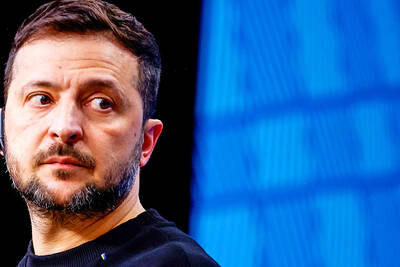Hungary and Slovakia stepped up a bitter war of words on Friday as Hungarian President Laszlo Solyom was forced to cancel a private visit after Bratislava said it would bar him from entering.
Standing half-way across a bridge over the Danube, on the border between the two countries, Solyom told reporters he would not travel to Slovakia.
“We have received the note of the Slovakian ministry of foreign affairs in which they forbid me personally entering Slovakia until midnight,” he said.
Slovakia had repeatedly criticized Solyom’s planned trip to a border town because it had been due to take place on the very day the country remembers an invasion by Soviet-led troops, among them Hungarians.
Aug. 21 is remembered in Slovakia as the day in 1968 when what was then Czechoslovakia was occupied by Warsaw Pact troops to crush the “Prague Spring” reform drive by the country’s communist leadership.
“This is a situation unheard of, inexcusable and unexplainable in the relationship of two allied countries,” Solyom said. “It is especially so because of the reasoning behind the ban: that my presence would mean a security threat.”
Solyom had been due to attend the unveiling of a statue of Stephen, a medieval king of Hungary, in the town of Komarno, just over the border.
The Hungarian town of Komarom lies on the southern bank of the River Danube, which marks the two countries’ border.
Hungarians make up 10 percent of Slovakia’s population of 5.4 million people, mostly living along the frontier.
“Komarno lies in Slovakia’s territory, it’s not a Hungarian town,” Slovak Prime Minister Robert Fico told reporters earlier on Friday.
Solyom would be welcome at any other time, he said, but coming on Aug. 21 was “mere provocation.”
Hungarian Foreign Minister Peter Balazs described the ban as “unprecedented and unacceptable” and said Budapest would raise the matter with the EU.
“The president’s visit had been carefully planned, together with the Slovakian foreign ministry,” he said on Hungarian public TV.

BLOODSHED: North Koreans take extreme measures to avoid being taken prisoner and sometimes execute their own forces, Ukrainian President Volodymyr Zelenskiy said Ukrainian President Volodymyr Zelenskiy on Saturday said that Russian and North Korean forces sustained heavy losses in fighting in Russia’s southern Kursk region. Ukrainian and Western assessments say that about 11,000 North Korean troops are deployed in the Kursk region, where Ukrainian forces occupy swathes of territory after staging a mass cross-border incursion in August last year. In his nightly video address, Zelenskiy quoted a report from Ukrainian Commander-in-Chief Oleksandr Syrskyi as saying that the battles had taken place near the village of Makhnovka, not far from the Ukrainian border. “In battles yesterday and today near just one village, Makhnovka,

Russia and Ukraine have exchanged prisoners of war in the latest such swap that saw the release of hundreds of captives and was brokered with the help of the United Arab Emirates (UAE), officials said on Monday. Ukrainian President Volodymyr Zelenskiy said that 189 Ukrainian prisoners, including military personnel, border guards and national guards — along with two civilians — were freed. He thanked the UAE for helping negotiate the exchange. The Russian Ministry of Defense said that 150 Russian troops were freed from captivity as part of the exchange in which each side released 150 people. The reason for the discrepancy in numbers

The foreign ministers of Germany, France and Poland on Tuesday expressed concern about “the political crisis” in Georgia, two days after Mikheil Kavelashvili was formally inaugurated as president of the South Caucasus nation, cementing the ruling party’s grip in what the opposition calls a blow to the country’s EU aspirations and a victory for former imperial ruler Russia. “We strongly condemn last week’s violence against peaceful protesters, media and opposition leaders, and recall Georgian authorities’ responsibility to respect human rights and protect fundamental freedoms, including the freedom to assembly and media freedom,” the three ministers wrote in a joint statement. In reaction

BARRIER BLAME: An aviation expert questioned the location of a solid wall past the end of the runway, saying that it was ‘very bad luck for this particular airplane’ A team of US investigators, including representatives from Boeing, on Tuesday examined the site of a plane crash that killed 179 people in South Korea, while authorities were conducting safety inspections on all Boeing 737-800 aircraft operated by the country’s airlines. All but two of the 181 people aboard the Boeing 737-800 operated by South Korean budget airline Jeju Air died in Sunday’s crash. Video showed the aircraft, without its landing gear deployed, crash-landed on its belly and overshoot a runaway at Muan International Airport before it slammed into a barrier and burst into flames. The plane was seen having engine trouble.